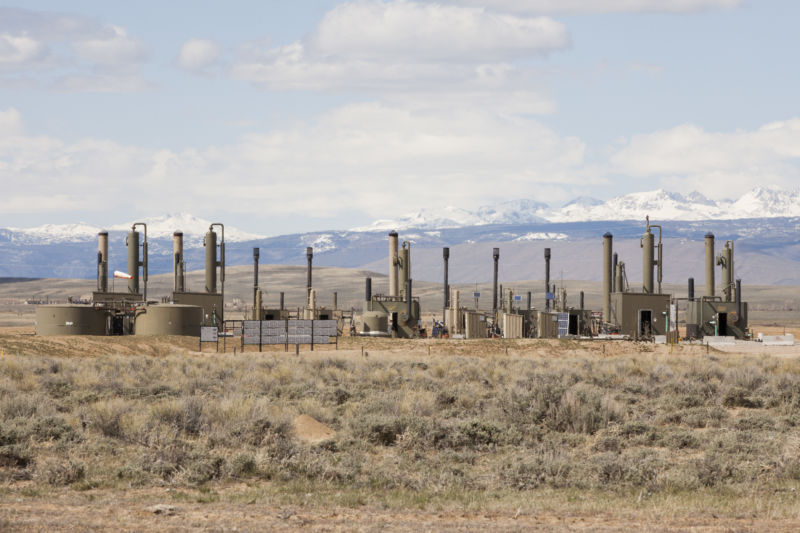
On Tuesday, a federal judge wrote that the Department of the Interior must complete a thorough climate change analysis when considering leasing public land for oil and gas extraction.
The opinion included an order to halt all new oil and gas leases on more than 300,000 acres of publicly managed land in Wyoming until the DOI’s Bureau of Land Management (BLM) can complete a proper review.
The case was initially brought in 2016 in the US District Court for the District of Columbia against former President Barack Obama’s DOI. The plaintiffs, WildEarth Guardians and Physicians for Social Responsibility, argued that the DOI made oil and gas lease sales in Colorado, Utah, and Wyoming without taking into account the “direct, indirect, and cumulative” impacts to the climate that drilling would have.
“In spite of the President’s commitment to US leadership in moving towards a clean energy future… Federal Defendants continue to authorize the sale and issuance of hundreds of federal oil and gas leases on public lands across the Interior West without meaningfully acknowledging or evaluating the climate change implications of their actions,” the plaintiffs wrote in 2016.
Though WildEarth Guardians et al. first filed its complaint against Obama’s DOI, President Trump’s administration has taken up the former administration’s place in defending the lease sales.
Downstream effects
Yesterday, the federal judge overseeing the case ordered the BLM to redo its climate analysis, though he didn’t weigh in on whether the BLM should or shouldn’t have moved forward with the oil and gas leases in question.
The judge did, however, say that the BLM failed “to provide the information necessary for the public and agency decision makers to understand the degree to which the leasing decisions” would contribute to climate change impacts. “In short, BLM did not adequately quantify the climate change impacts of oil and gas leasing,” the judge wrote.
At the heart of the matter, the plaintiffs argued that the BLM should have conducted lengthy Environmental Impact Studies (EIS) for nine tracts of land that would be leased out to oil drillers. Instead, the Bureau issued more preliminary Environmental Assessments (EA) that led to findings of no significant impact. Nine EAs covering approximately 303,000 acres of land in Wyoming were specifically analyzed in this case.
“The EAs discuss climate change on a conceptual level,” the judge wrote on Tuesday. “They summarize Wyoming’s current climate, explain the mechanics of climate change, acknowledge that oil and gas drilling contributes to climate change, and predict the impact of climate change on the state’s climate.” The EAs also admit that greenhouse gases (GHGs) will increase with drilling, but they don’t attempt to quantify by how much, offering that it’s too difficult to predict how many wells would be drilled in each region.
The EAs also claim that the effect of any single well on climate is negligible “compared to total national or global emissions,” although this only takes into account emissions at the site of the well.
But the plaintiffs say that’s problematic because the National Environmental Policy Act (NEPA) requires agencies to analyze the indirect consequences of an action. In this and other environmental lawsuits, defendants have argued about where the line on “indirect consequences” is drawn. But the Judge in this case wrote that BLM must take into account the effect that using and burning fossil fuels will have on the environment because “producing oil and gas for consumption” is the whole point of leasing the land.
“Downstream use of oil and gas, and the resulting GHG emissions, are thus reasonably foreseeable effects of oil and gas leasing,” the judge wrote.
Appeals are coming
The Western Energy Alliance, a proponent of oil and gas production in the West, had intervened as a defendant in the case, arguing on behalf of the BLM’s decision to approve the oil and gas leases. On Wednesday morning, Alliance President Kathleen Sgamma told Ars that appeals were certainly coming.
“Obviously, we’re disappointed that the judge threw out decades of legal precedent in this ruling,” Sgamma wrote.
“BLM under the Obama Administration did the correct level of GHG analysis at the leasing stage…” she continued. “The judge is asking BLM to take a wild guess at how many wells would be developed on these leases and analyze GHG impacts for wells that will never be developed. This ruling, with its overreaching halt to drilling permits and repudiation of decades of precedent, is ripe for successful appeal. Western Energy Alliance has been an active intervenor defending leasing in the case, and we will continue to do so as this ruling is appealed.”
But as expected, WildEarth Guardians and Physicians for Social Responsibility declared the opinion a victory. “While the ruling applies to Wyoming, it has implications for public lands across the American West and is a major rebuke to the Trump administration’s anti-environment, anti-climate agenda,” the statement said.
“It’s high time the federal government was held accountable for the costs of sacrificing our public lands for dirty oil and gas,” Samantha Ruscavage-Barz, managing attorney for WildEarth Guardians, said. “This win demonstrates the Trump administration can’t legally turn its back on climate change.”
https://arstechnica.com/?p=1477233

